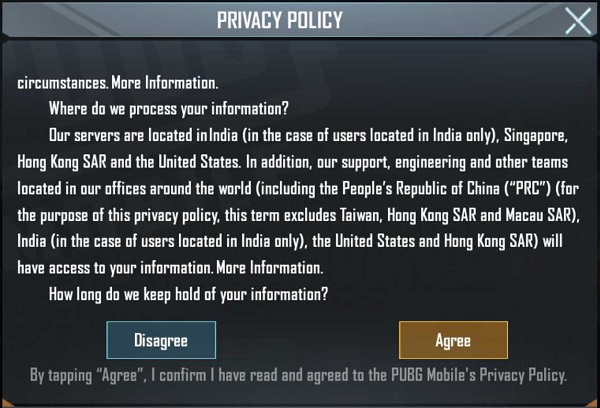After banning 59 Chinese apps, the Indian Ministry of Electronics and Information technology (MeitY) is now scanning 275 more Chinese apps for any potential security threats. Unfortunately, this time, PUBG Mobile is also under the Indian Government’s radar. That’s because the battle royale game is published by Tencent, a Chinese Conglomerate.
So, it’s understandable why mobile gamers are worried about PUBG Mobile ban in India. However, Tencent recently updated its Privacy Policy specifically for Indian users which could be an attempt to escape the ban in the country.
PUBG Mobile Updates Its Privacy Policy

Just a few hours ago, PUBG Mobile started giving a popup notification to its Indian users to inform them about their ‘Updated Privacy Policy.’
In the message, the PUBG Mobile team states that their servers are located in India, the USA, Hong Kong SAR, and Singapore. And according to the updated privacy policy, all the personal data of Indian users is stored in Indian servers only.
By banning Chinese apps, MeitY wants to protect citizens’ data from the hands of the Chinese Government. The major reason cited behind the ban is storing user data outside the country poses a threat to the security of the nation.
So, by ensuring that the personal data of Indian users will be stored in local servers, PUBG Mobile might just be able to escape the ban in India. And I must say this was a smart move which would seem reassuring to PUBG fans in India.
But there is a caveat!
The Privacy Policy also states that PUBG Mobile’s support, engineering, other teams located around the world, including the People’s Republic Of China, Singapore, and “India (In the case of users located in India only), the United States, and Hong Kong SAR have access to your information.
From the above statement, PUBG Mobile wants to make it clear that for Indian users, PUBG Mobile has local support and engineering team. However, the fact that “only” PUBG Mobile team from India could access the Indian user’s information has been kept quite ambiguous and it depends on how the government interprets it.
For now, we have reached out to the PUBG mobile to get more clarification on what this actually means, and we are yet to hear from them. We’ll update the story as soon as we get a more concrete idea.
Not to forget the data collection…
Meanwhile, PUBG Mobile has mentioned it is still allowing third parties to collect and use the personal data of users. Tencent promises to take ‘reasonable measures’ to ensure that the third parties do not further disclose any personal information. But we don’t know how ‘good’ those measures are.
However, if users are concerned about their collected data, then they can contact PUBG Mobile to access, or erase their personal data.
Right now, it’s hard to say for sure if PUBG Mobile will get banned in India or not. However, shifting Indian user data to servers in the country and being more transparent in its Privacy Policy might help PUBG Mobile escape the impending ban.
The post PUBG Mobile Ban In India: Here’s Why The Chinese App Could Escape The Ban appeared first on Fossbytes.

 from Fossbytes https://ift.tt/306QL7w
from Fossbytes https://ift.tt/306QL7wvia IFTTT
Comments
Post a Comment